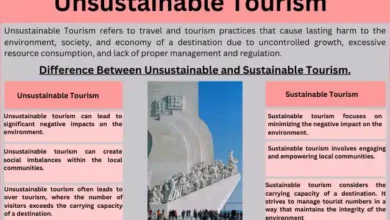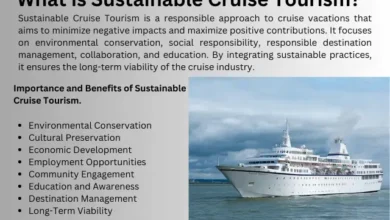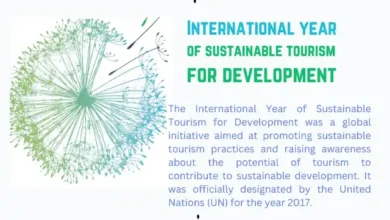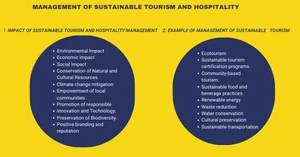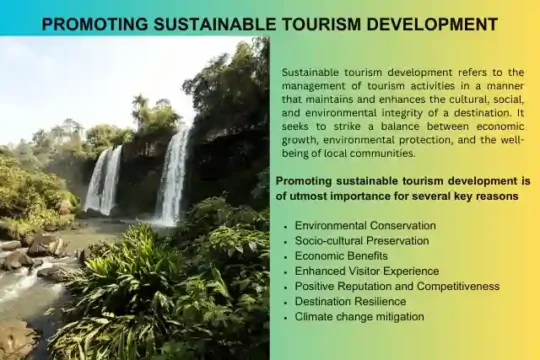
Promoting Sustainable Tourism Development
Sustainable tourism development is an essential approach that aims to minimize the negative impacts of tourism on the environment, culture, and local communities while maximizing the positive contributions it can bring. In recent years, there has been an increasing global recognition of the importance of sustainable tourism as a means to preserve natural and cultural heritage, foster economic growth, and ensure long-term benefits for destinations and stakeholders. This article explores the significance of promoting sustainable tourism development and highlights key strategies that can be implemented to encourage responsible travel.
Benefits of Sustainable Tourism Development
The adoption of sustainable tourism practices brings numerous benefits to destinations, local communities, and tourists alike.
- Economic Benefits
- Environmental Benefits
- Social Benefits
- Tourist Experience
Economic Benefits
Sustainable tourism can stimulate economic growth and generate employment opportunities. By promoting local businesses, supporting small-scale enterprises, and encouraging the consumption of local products and services, sustainable tourism can contribute to the economic development of communities.
Environmental Benefits
Sustainable tourism helps protect and conserve natural resources, mitigating the negative impacts of tourism on ecosystems and biodiversity. By preserving pristine natural environments, destinations can continue to attract visitors and maintain their appeal in the long run.
Social Benefits
Sustainable tourism development enhances the well-being of local communities by creating a sense of pride and ownership over their cultural and natural heritage. It promotes cross-cultural understanding, encourages social inclusiveness, and fosters respect and appreciation for different cultures.
Tourist Experience
Sustainable tourism provides tourists with unique and authentic experiences. By engaging with local communities and immersing themselves in local traditions, tourists gain a deeper understanding of the destination and its cultural richness.
Understanding Sustainable Tourism Development
Sustainable tourism development refers to the management of tourism activities in a manner that maintains and enhances the cultural, social, and environmental integrity of a destination. It seeks to strike a balance between economic growth, environmental protection, and the well-being of local communities. Sustainable tourism aims to minimize the negative impacts of tourism while maximizing the positive benefits, creating a more sustainable and responsible tourism industry.
- Preserving the Environment
- Empowering Local Communities
- Preserving Cultural Heritage
Preserving the Environment
One of the primary objectives of sustainable tourism development is the preservation of the natural environment. Tourism, when not managed properly, can lead to environmental degradation, habitat destruction, and loss of biodiversity. Sustainable tourism practices focus on minimizing resource consumption, reducing waste and pollution, and protecting fragile ecosystems. This includes promoting Eco-friendly accommodations, encouraging sustainable transportation options, and raising awareness about responsible behavior among tourists.
Empowering Local Communities
Sustainable tourism development also emphasizes the empowerment of local communities. It recognizes the importance of involving and benefiting local residents in the tourism industry. By engaging local communities in decision-making processes and providing them with economic opportunities, sustainable tourism can foster social inclusiveness and alleviate poverty. This can be achieved through initiatives such as community-based tourism, which allows visitors to directly interact with local communities and support their livelihoods.
Preserving Cultural Heritage
In addition to environmental conservation, sustainable tourism development aims to preserve the unique cultural heritage of destinations. Tourism can have both positive and negative impacts on local cultures and traditions. Sustainable tourism practices respect and promote the authenticity of local cultures, ensuring that tourism activities do not erode cultural identities. This involves promoting cultural exchange, supporting local artisans and craftsmen, and educating visitors about local customs and traditions.
Importance of Promoting Sustainable Tourism Development
Promoting sustainable tourism development is of utmost importance for several key reasons.
- Environmental Conservation
- Socio-cultural Preservation
- Economic Benefits
- Enhanced Visitor Experience
- Positive Reputation and Competitiveness
- Destination Resilience
- Climate change mitigation
Environmental Conservation
Sustainable tourism development focuses on minimizing negative impacts on the environment. By adopting sustainable practices, such as reducing carbon emissions, conserving water and energy, and preserving natural resources, tourism can operate in harmony with nature. This ensures the preservation of ecosystems, biodiversity, and sensitive habitats, protecting them for future generations.
Socio-cultural Preservation
Sustainable tourism development respects and preserves the socio-cultural fabric of local communities. It promotes community involvement, empowerment, and the preservation of cultural heritage. By engaging with local residents, respecting their customs and traditions, and supporting local businesses, sustainable tourism helps maintain cultural authenticity and encourages cross-cultural understanding and appreciation.
Economic Benefits
Sustainable tourism development contributes to local economic growth and provides socio-economic opportunities. It promotes the creation of jobs, stimulates entrepreneurship, and supports small-scale businesses, including those offering authentic local experiences and products. By distributing tourism benefits among the local community, sustainable tourism helps alleviate poverty, reduce inequalities, and enhance community well-being.
Enhanced Visitor Experience
Sustainable tourism offers unique and meaningful experiences for visitors. It enables travelers to connect with local communities, immerse themselves in different cultures, and appreciate natural landscapes. Sustainable tourism emphasizes authenticity, responsible behavior, and respect for local customs, enhancing the quality of the visitor experience and fostering positive interactions between tourists and locals.
Climate Change Mitigation
Sustainable tourism plays a crucial role in addressing climate change. By promoting energy efficiency, utilizing renewable energy sources, and reducing carbon emissions, tourism can contribute to global efforts to mitigate climate change. Sustainable practices in transportation, accommodation, and activities help minimize the carbon footprint of tourism, making it a more climate-friendly industry.
Destination Resilience
Sustainable tourism development builds resilience in destinations, enabling them to adapt to environmental, social, and economic changes. By diversifying tourism products and experiences, destinations become less dependent on seasonal tourism and better prepared to withstand crises and disruptions. Sustainable practices, such as disaster risk management and sustainable infrastructure development, enhance the resilience of destinations and protect their long-term viability.
Positive Reputation and Competitiveness
Sustainable tourism development enhances the reputation and competitiveness of destinations. Travelers increasingly seek destinations that prioritize sustainability, favoring those with responsible practices and certifications. By promoting sustainable tourism, destinations can attract a growing segment of environmentally conscious travelers, differentiate themselves in the market, and gain a competitive advantage.
Conclusion
Promoting sustainable tourism development is crucial for preserving our natural and cultural heritage, supporting local communities, and ensuring the long-term viability of the tourism industry. By implementing destination management plans, supporting Eco-friendly accommodations, involving local communities, promoting responsible tourism education, encouraging sustainable transportation, preserving natural and cultural heritage, and fostering collaboration and partnerships, we can create a more responsible and sustainable tourism industry that benefits both present and future generations.
You may like:
International year of sustainable tourism for development

